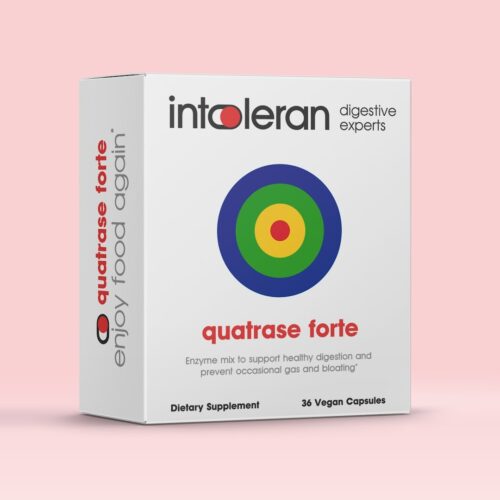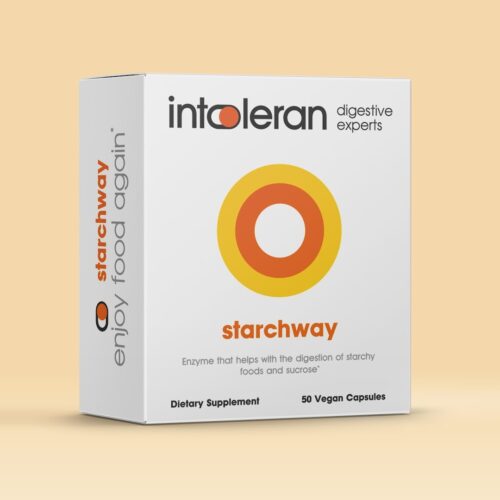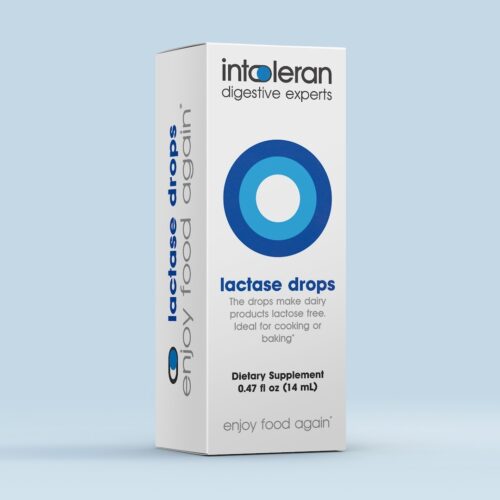A food intolerance is a hypersensitivity reaction to a component in food, such as lactose or fructose. Read more about food intolerances below!
A food intolerance is a hypersensitive reaction to an element in food, such as lactose or fructose. In the case of food intolerance, there is often a problem with the breakdown of certain foods. This may be due to the fact that there is a deficiency of a certain enzyme or an enzyme is completely missing. Normally, carbohydrates, fats, and proteins are broken down in the small intestine. If your digestion is not working adequately, these nutrients end up in your large intestine. There, the intestinal bacteria take care of the breakdown of these nutrients. The problem is that this so-called ‘fermentation’ process often releases gas and moisture which causes unpleasant intestinal problems.
The umbrella term for food allergy and food intolerance is ‘food hypersensitivity’. There is a clear difference: with an allergy there is an overreaction from the immune system to certain ingredients in your food, causing an allergic reaction. For example, the body makes antibodies against gluten, cow’s milk, or nuts. An intolerance does not involve the immune system but is due to the fact that there is a problem with the breakdown of certain components in your diet. We call a food allergy an allergic food hypersensitivity and an intolerance a non-allergic food hypersensitivity.
By far, the most common intolerance is to lactose, a milk sugar found particularly in dairy products. In addition to a lactose intolerance, fructose intolerance and fructan- and galactan-intolerances are also common.
It is not always known what exactly causes food intolerances. In many cases, there is an enzyme problem, whereby there is a deficiency of a certain enzyme in the small intestine or the complete absence of an enzyme. An intolerance can also be caused by a malfunctioning transport mechanism that makes it difficult for certain foods to pass the intestinal wall. This is the case, for example, with fructose intolerance.
Absorption of certain nutrients can sometimes be difficult or even impossible through the intestinal wall. We call this: Malabsorption. An enzyme or absorption problem can occur acutely, for example, due to an intestinal infection or intestinal surgery. It can also develop progressively and worsen with age. Certain types of intolerances can also be genetic, such as congenital lactose intolerance or sucrose intolerance.
In most cases, food intolerance is characterized by various intestinal symptoms that can be different in severity from person to person. The most common complaints and symptoms of food intolerance are:
- A bloated belly
- Constipation (obstipation)
- Diarrhea
- Intestinal cramps
- Flatulence
If you have symptoms that you are unsure about contact a doctor or dietitian.
There is no medicine to treat a food intolerance. However, you can improve or limit the symptoms by adjusting your diet or by using tools, such as supplements.
If you know that you are sensitive to a certain food ingredient, such as lactose or fructose, there are steps you can take to manage this sensitivity. Depending on the degree of intolerance, you can completely eliminate or limit foods that contain such a component. For example, there are lactose-free diets and diets with a limited amount of lactose.
A dietitian can help you put together a suitable diet so that you can have a full diet despite an intolerance. A dietitian can also help you find alternative foods, such as lactose-free or plant-based products in the case of a lactose-free diet. Dietary solutions can make an important difference in reducing or eliminating the symptoms of food intolerance.
If you know which food components you are intolerant to, you can take supplements with digestive enzymes. These help you to properly digest the components in food to which you are intolerant. If you don’t want to or can’t stick to your lactose-free diet, capsules with the lactase enzyme can help. This allows you to eat or drink food with lactose without experiencing unpleasant symptoms.
For most intolerances there are supplements available. The supplements vary in type, size and doses. There are also combination supplements that contain multiple enzymes that you can use if you suffer from different intolerances.
Fortunately, there is a very good way to live with food intolerance. In addition to dietary solutions and the use of supplements, there are more ways to make life with a food intolerance a little easier.
It is recommended that you get help from a health professional. This can be a doctor, but dietitians are often more specialized in the counseling and treatment of food intolerances. They can help you with customized advice on foods that you can tolerate. In addition, they can advise you on supplements and other tools. This way you are less limited in the foods you can eat and you do not have to go through life with intestinal problems anymore. Feel free to ask one of our dieticians for free advice.
There are many people with food intolerances who are in the same situation as you. By sharing tips and inspiration with each other, we can make living with a food intolerance easier. There is a number of bloggers who write useful articles in which they share tips that you can benefit from. We highly recommend the blogs of Karlijn’s Kitchen. You can also get in touch with others in the community via social media and learn more about how others cope with their food intolerance in everyday life.
digestive enzymes
Digestive enzymes are proteins that can break down food into small pieces in the small intestine. As a small piece, the food can be absorbed into the bloodstream and used as energy. An example is the digestive enzyme Alpha Galactosidase, which supports the breakdown of complex carbohydrates from vegetables, legumes and cereals.*
If digestive enzymes are deficient, food cannot be properly absorbed. This can lead to fermentation in the colon, with risk of gas formation.
*Health claim pending European approval.

free advice from our dietitians
Let us help you with your digestive complaints, like we’ve helped many others. We will help you find the solution that fits your needs best.
Fill out our contact form and we will get back to you
our unique range of products

do my symptoms fit a food intolerance?
intolerance checklearn more about food intolerances
At least 1 in 10 people suffers from food intolerance. There are different types of food intolerances, such as lactose, fructose, or histamine intolerance. Learn more about food intolerances on our intolerances pages below.
lactose intolerance
Lactose is a type of sugar found in milk and other dairy products, among others. Lactose is normally broken down in the small intestine. There,…
fructose intolerance
Fructose, also known as fruit sugar, is a type of sugar mainly found in various fruits, vegetables, honey and processed foods. You can read more…
FODMAP
FODMAP is a collective name for different types of hard-to-digest carbohydrates that can cause annoying intestinal complaints. You can read more about the different FODMAPs…
fructans and galactans intolerance
Fructans and galactans are hard-to-digest carbohydrates that many people can have an intolerance to. You can read more about fructan or galactan intolerance below. what…
histamine intolerance
Histamine intolerance may not be very well known, but it is still common and can cause annoying symptoms such as skin complaints or intestinal discomfort….

 EN
EN NL
NL IT
IT FR
FR ES
ES AU
AU SG
SG








